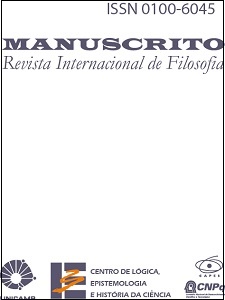Resumo
After some preliminary remarks in §1, I argue in §2 that Claudio’s considerations about my treatment of Quine’s Bizet-Verdi counterfactuals do not constitute a difficulty for the structural analysis of such counterfactuals. I discuss some of his other examples and argue that counterfactuals are ambiguous both structurally and contextually. I conclude with an examination of the principle of transitivity for counterfactuals.Referências
CHATEAUBRIAND, O. “Ockham’s Razor”. O Que Nos Faz Pensar, 3, pp. 51-75, 1990.
GOODMAN, N. “The Problem of Counterfactual Conditionals”. The Journal of Philosophy, XLIV, pp. 113-28, 1947.
LEWIS, D. Counterfactuals. Cambridge, Mass.: Harvard University Press, 1973.
PIZZI, C. “Causality and the Transitivity of Counterfactuals”. O Que Nos Faz Pensar, 7, pp. 89-103, 1993.
QUINE, W. V. Methods of Logic. Third edition. New York, N.Y.: Holt, Rinehart and Winston, 1972.
QUINE, W. V. Word and Object. Cambridge, Mass.: The MIT Press, 1960.
RESCHER, N. (ed.) Studies in Logical Theory. American Philosophical Quarterly Monograph Series. Oxford: Blackwell, 1968.
STALNAKER, R. “A Theory of Conditionals”. In Rescher, N. (1968), pp. 98-112.
QUINE, W. V. Word and Object. Cambridge, Mass.: The MIT Press, 1960.
RESCHER, N. (ed.) Studies in Logical Theory. American Philosophical Quarterly Monograph Series. Oxford: Blackwell, 1968.
STALNAKER, R. “A Theory of Conditionals”. In Rescher, N. (1968), pp. 98-112.

